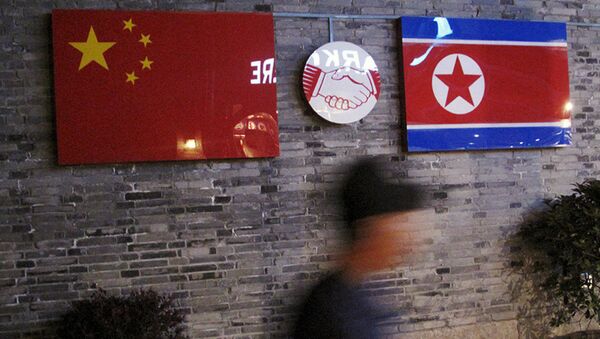The diplomat didn’t provide any specific regarding the allegedly transgressing companies, but declared that they all must be held accountable for their actions.
On September 26 the US announced sanctions against China's Dandong Hongxiang Industrial Development Co and four of its employees for allegedly supplying aluminum oxide to North Korea in violation of the existing UNSC restriction – an act that Fried said should serve as a warning to Beijing.
However, it appears that the US is merely using the North Korean issue as an excuse to ‘lean on’ China, Konstantin Asmolov, a leading research associate at the Center for Korean Studies of the Institute for Far Eastern Studies at the Russian Academy of Sciences, told Sputnik.
"This is not just an issue of a Chinese company trading with North Korea, but rather an attempt to put pressure on China by using North Korea as a pretext. How does the US Congress receive information about this particular company sending something to North Korea? Where could this information originate, considering that the US intelligence has no presence in North Korea? The ‘Korean’ card is essentially a source of leverage in US-China relations. One may remember how Donald Trump recently said that China must deal with North Korea or watch its trade with the US suffer," Asmolov remarked.
It should be noted that Washington came up with the idea of imposing sanctions against Chinese companies when it became apparent that sanctions alone weren’t enough to put an end to the North Korean nuclear and missile programs, and it appears quite likely that this new standoff between Beijing and Washington may further complicate any attempts to resolve this issue.
"Right now, both China and the US are facing a difficult choice of how to solve the Korean issue because de facto it was never solved. And a declaration made recently by North Korea, which states that Pyongyang finished developing nuclear weapons, puts an end to the discussion. On one hand, China cooperated with the US during preparations of a UNSC resolution that followed the fourth North Korean nuclear test, though the motives behind China’s move remain unclear. According to the most popular version, China told the US that “there are many problems plaguing our relations, so as we resolve the Korean issue, why don’t you start taking Chinese interests in other spheres into consideration?” But afterwards the US made a decision to deploy THAAD systems in South Korea and started attacking China’s stance on the South China Sea problem. And facing this situation, the Chinese leadership has probably learned an unpleasant lesson that the US doesn’t fulfil the promises it makes," Asmolov added.
Meanwhile, Wang Zhiming, head of the Research Institute of Globalization and China’s Modernization at the University of International Business and Economics, told Sputnik that while China doesn’t oppose implementing new sanctions against North Korea, such prohibitive measures shouldn’t be used without careful consideration.
"China, along with the rest of the UN, supports imposing sanctions against Korea. However, it should be noted that the goal of UN sanctions is to motivate North Korea to stop testing nuclear weapons, not to create a ‘blockade’ for its people. China is against the US imposing sanctions against North Korea based on its domestic legislation alone, as this course of actions is utterly wrong. The implementation of sanctions is an international act, this is not a unilateral decision to be made by the US alone," he said.
At the same time, Chinese Foreign Ministry spokesman Geng Shuang declared that the North Korean nuclear issue wasn’t triggered by China’s actions, and Beijing doesn’t hold a key to its resolution as the problem originated from the differences between the US and North Korea. He further added that the ongoing trade between China and North Korea in coal and other minerals is being conducted in full adherence to all existing resolutions, as well as Chinese laws.


